North Korea crisis: What will Russia do?
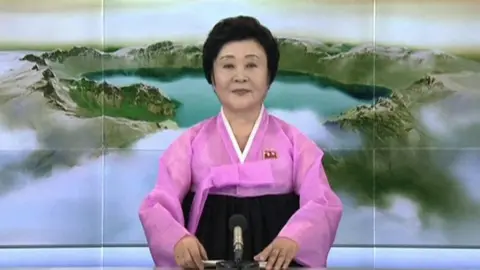 Reuters
Reuters"It smells of freshness, and of our deep respect for our leader," the woman declared, smiling to the Russian TV camera.
A North Korean, she'd just sniffed a big red flower named after the country's former leader Kim Jong-il.
Part of a series of glowing reports on everyday life in the secretive state, covering topics from fashion to food, the moment was broadcast to millions of Russians watching state television over their breakfast.
The coverage suggested Russia was taking a rather different approach over North Korea's nuclear programme and its missile tests, two weeks after Donald Trump tweeted that the US military was "locked and loaded", primed to respond with what he called "military solutions".
Vladimir Putin has underlined those differences many times this week, warning against whipping up "military hysteria", and insisting that North Koreans would rather "eat grass" under more sanctions, than give up their weapons programme.
And while he has criticised recent missile tests as "provocative", he's also taken pains to explain them.
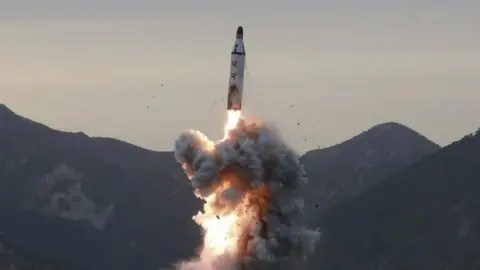 EPA
EPANorth Koreans remember the 2003 US invasion of Iraq over Saddam Hussein's alleged weapons programme, Mr Putin reasoned.
So the country sees becoming a nuclear state as its only sure-fire guarantee of self-defence.
'Paranoid'
"Russia believes that Pyongyang's aim is not to bomb anyone, that its [nuclear programme] is a deterrent against South Korea and the US," explains Alexander Gabuev of the Moscow Carnegie Centre.
"Russia understands that because it is just as paranoid about American 'democracy promotion' as North Korea is," he adds.
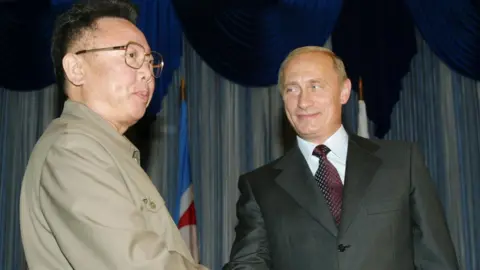 AFP
AFPPersonal experience is perhaps also partly why Russia - under US sanctions itself - opposes imposing further penalties on Pyongyang to halt its nuclear ambitions.
The US wants the international community to apply more economic pressure, including a full energy embargo and a ban on hiring North Korean labourers.
"What are we going to do? Stop all energy exports so people freeze and ambulances have no fuel to reach the sick?" asks Georgy Toloraya, a Russian diplomat who spent many years in North Korea.
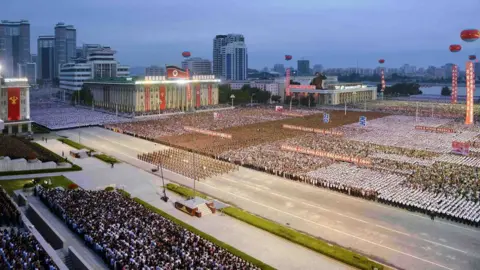 KCNA
KCNAHe says Russia's position is motivated by a principle, rather than concern over lost trade.
President Putin himself described energy exports to its neighbour as "practically zero", though some 30,000 North Koreans are employed in logging and construction in Russia's Far East.
They are essentially hired out by the state which pockets most of their pay.
"It's not about whether Russia has any leverage. The question is why should we use that?" Mr Toloraya asks.
Buffer
"Our whole concept does not allow for the isolation and strangulation of North Korea, and the weakening of the regime," he explains.
Like China, Russia shares a border with North Korea and sees it as a buffer against South Korea, a political and military ally of the US.
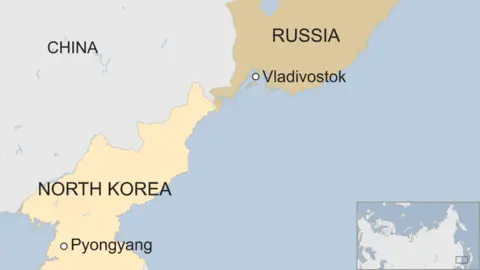
Moscow and Beijing have presented their own road map for resolving the conflict.
As a first step, it calls for a joint freeze of Pyongyang's missile tests - and US and South Korean military exercises. The next step would be bringing all sides together for talks.
Leverage?
Some suggest that strategy is more about posturing than peace: that Russia wants to insert itself into another global crisis.
"Russia knows that plan won't fly, but it makes the US look bad," Alexander Gabuev argues. "At least China and Russia have a peaceful programme, whereas the US president is just tweeting about fire and fury."
He believes Moscow's leverage with Pyongyang these days is minimal, despite years of Soviet support for the regime.
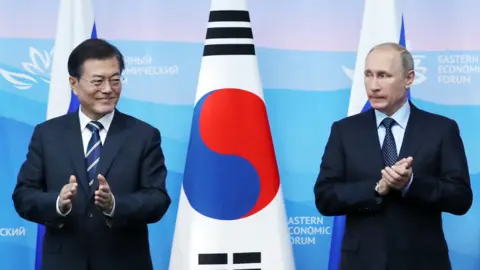 EPA
EPABut this week, following a trip to China, President Putin hosted the leaders of South Korea and Japan at an economic forum in eastern Russia, also attended by a delegation from North Korea.
Historic ties
They were in Vladivostok, which felt the tremors from Pyongyang's latest missile test.
"It's in our interests to have a peaceful, stable neighbour," Georgy Toloraya argues.
"As for North Korea, Russia is the least hostile of all the great powers involved in resolving this crisis," he says, insisting that historic ties mean Russia still knows "many people" who matter there.
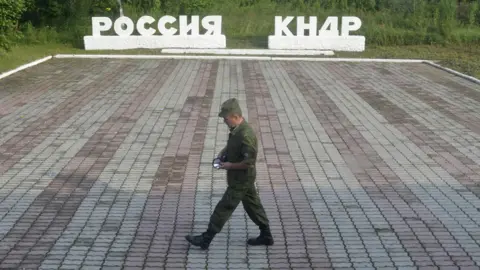 Reuters
ReutersA few years back, President Putin wrote off most of North Korea's Soviet-era debt in a major goodwill gesture.
Recent efforts to improve ties have included a ferry service to the peninsula, and even a North Korean tourism agency in Moscow, presumably banking on a rush of visitors keen to sniff flowers named after its leaders.
The ferry has since been suspended due to lack of demand.
All this is unfolding as Russia's relations with Washington have plummeted amid allegations of interference in the US elections, sanctions and tit-for-tat diplomatic expulsions.
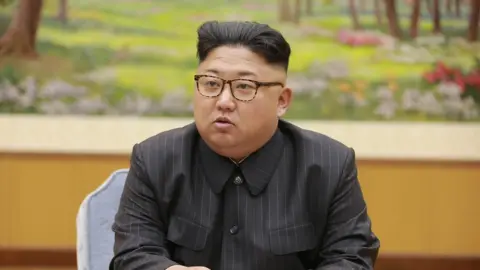 KCNA
KCNAThat gives Moscow little incentive to back the US against Pyongyang. It knows the power to reward Russia by lifting sanctions now lies with a hostile US Congress.
'Creep towards war'
Meanwhile, Russian ties with China have been increasing in importance.
So the two continue to push for talks as the best way to prevent an accidental escalation of the Korean crisis into actual conflict.
"The Americans need to make contact [with Pyongyang] and the sooner the better. We can pass information on, if they want," says Mr Toloraya.
"Talks can go on for 10 or 20 years if necessary. But for that time we would have stability, not this creep towards war."
